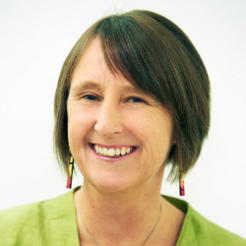The Big Lottery Fund’s new chief executive is toying with the idea of sharing the data and insights provided by its grant applicants and recipients in an “open data” format so as to improve grantmaking across the board.
Speaking to journalists at a breakfast briefing this morning, Dawn Austwick (pictured) outlined ‘knowledge’ as one of three key areas of interest for her as she settles in to the role. With 12,000 funded projects worth £600m under way every year, Austwick said that the scale of BIG’s grantmaking provided an “incredible opportunity” to learn more and respond to developments as they happen in the sector.
This data, said the former Esmee Fairbairn Foundation chief executive, “is a very, very rich resource that should be available to not just us, but others to enrich our thinking”.
Asked by civilsociety.co.uk what form this sharing might take, Austwick – who is just six days into her post – said that, at the most radical, “maybe we should look at something like open source”.
“Typically funders are slow and ponderous. The modern world allows us to be faster and more fleet of foot,” she said. In the past BIG hasn’t been able to track trends in grant applications, but a new system might enable it to pick up on spikes in applications for grants of a particular size or purpose and respond to that. A spokesman for the funder said the data shared would not be sensitive.
“As a funder you have to be very vigorous in always reminding yourself that the knowledge and wisdom is out there. You have to impose upon yourself the discipline of listening.”
Social capital and sustainability
In additional to knowledge, Austwick outlined two other areas of early thinking with regard to the future of BIG under her leadership.
She has tasked the funder with "building social capital" as a means of earlier early intervention or prevention for social problems. Giving the example of the funder’s work in early childhood – with at-risk children aged up to three years old – she said a future approach might be to address the lack of social capital in the communities where children end up being at risk. Expressing support for programmes like Big Local, where Big England works with some of the most deprived communities in England over ten years to prioritise, fund and roll out community initiatives, Austwick said she favoured an approach which mixed both external intervention as well as grassroots actions and support. She said that at the end of such interventions, BIG should ideally be redundant.
“If you don’t want to change the world, then why are we here?” she said.
Austwick also wants BIG to play a role in building a voluntary and community sector which is “more adaptive”. BIG should work to improve communication and best practice among funders, she said, but added that this too had its limits.
“Yes, I do think funders should be better at talking to each other,” she said. “We could work together more… but there’s a slight danger that those who get invited become ‘over-convened’.”
The new chief executive discussed some of her favourite projects funded by her former employer during her tenure and listed Uprising, a civic participation scheme for young people, food-growing communities and community foundations. The link between these, she said, was that they were entrepreneurial - in terms of "get up and go" - and that they were "asset-based" and built something.
No politicians or hobby horses
In the summer Acevo chief executive Sir Stephen Bubb suggested that BIG is not independent enough from government, and that politicians like to use the funder to earmark money for their own hobby horses, but Austwick said the funding didn’t bear this out.
“I haven’t come across any politicians or hobby horses yet,” she said. “Our accountability is to the lottery-playing public.”
While the funder will have a necessary relationship with Whitehall, she said this was balanced by engaging with other stakeholder groups.
“In making decisions about how we fund, we have to listen to all sorts of people,” she said. “In the 360-degree vision, maybe 90 degrees is government and 270 degrees is everyone else.”
Social investment is a tool
Austwick, who through her tenure at Esmee Fairbairn and as a trustee of Big Society Capital has more experience than most in social investment, said that grants will remain dominant in BIG’s future. Just this summer, BIG launched a £40m social impact bond, indicating a pre-Austwick increased appetite for this new funding mechanism.
“Big Lottery Fund is fundamentally a grant funder,” she said.
“It has a role in helping support the sector to flourish and social investment is a potential tool in the toolkit… In some cases social investment is a better way to fund than using a grant.”
Confident on National Lottery price hike
Civilsociety.co.uk asked Austwick whether the National Lottery decision to increase the ticket price on some of its games to £2, which came into effect last week, will have any impact on revenues to the Big Lottery, to which the chief executive said: “We will have to wait and see."
However, she said she was confident in the projections made by National Lottery operator Camelot that the price hike would have a positive impact. Camelot has a history of making sound projections, she said.









